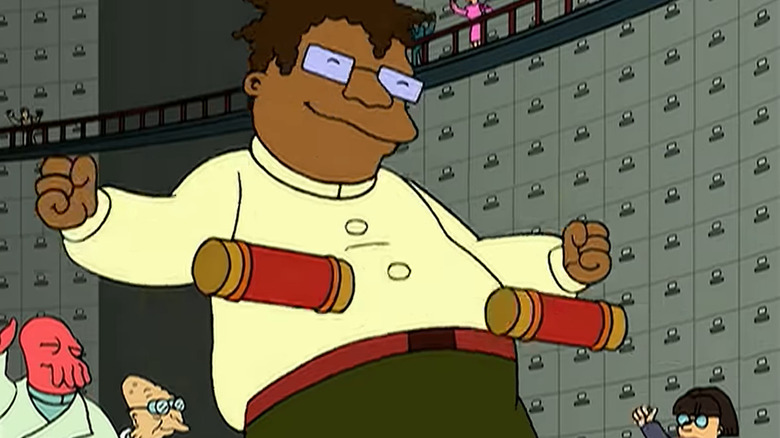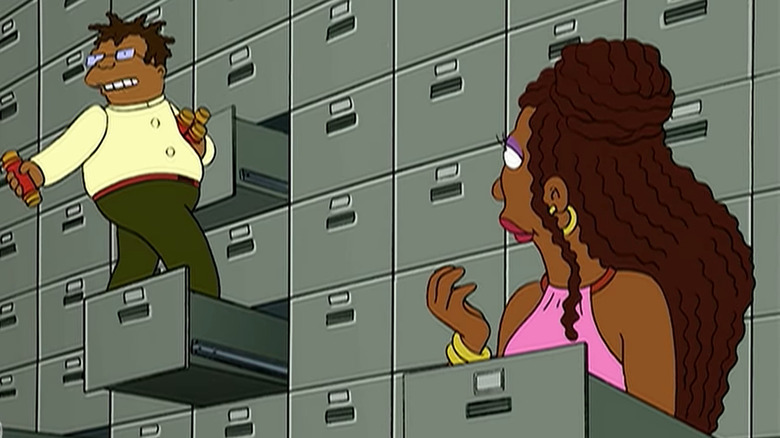How Hermes Got His First Standout Episode In Futurama
One thing that quickly became clear in the early "Futurama" episodes is that not every member of the Planet Express crew has the same importance. The show largely revolves around the big three of Fry, Leela, and Bender, with Professor Farnsworth right behind them. In a separate tier are Amy, Hermes, and Zoidberg, who are usually present in any given example but only rarely get their time in the spotlight. Amy didn't really lead the A-plot of an episode until season 7's "That Darn Katz," for instance, although the early seasons' "Put Your Head On My Shoulders" and "Amazon Women in the Mood" also give her some interesting material to work with. Zoidberg also rarely gets to be the main character, although he can take solace in how he still gets way more focus than poor Scruffy.
Hermes, meanwhile, is a character usually stuck hanging around in the episode's B-plot. As a bureaucrat, he rarely goes on adventures with the rest of the crew, and he's usually instead dealing with parenting problems (often alongside Farnsworth) or marital problems (thanks to that pesky Barbados Slim constantly stealing his wife). "Futurama" did give him an A-plot in the latest season, allowing him to basically solve COVID-19 once and for all, but for the most part, he's easy to forget about. Although it's his bureaucratic experience that keeps Planet Express running smoothly — well, smoothly enough — it's hard sometimes not to take him for granted.
That's why it feels so fitting that Hermes' first big episode in season 2, "How Hermes Requisitioned his Groove Back," was all about exploring what happens when he's no longer here. Hermes may feel like a non-entity, the episode establishes, but once you take him out of "Futurama," the whole Planet Express crew falls apart.
Hermes' terrible vacation
The season 2 episode starts with Hermes being unfairly demoted and given paid time off. After a dramatic suicide attempt, Zoidberg recommends that he go to a relaxing spa day on a sauna planet, which turns out to be a forced labor camp. (On a totally unrelated note, Hermes absolutely despises Zoidberg from this point on.) Although the camp is pure suffering at first, Hermes manages to use his bureaucratic skills to improve the camp's efficiency, giving him the confidence he needs to defeat his replacement and return to his previous role.
It's a full, satisfying character arc for Hermes, but it's not the A-plot of the episode. Instead, most of the story focuses on the rest of the Planet Express crew adjusting to life without Hermes and, in Fry's case, adjusting to an unexpected romance with the new bureaucrat Morgan Proctor (Nora Dunn). Morgan is attracted to Fry's slobbish ways, even though she knows that such a romance is forbidden. Soon she steals Bender's brain to protect her secret and sends it to the Central Bureaucracy building, and the rest of the Planet Express crew must journey to get it back. This is the storyline the episode mostly focuses on, although that initially wasn't the plan. As the episode's screenwriter Bill Odenkirk explained in the DVD audio commentary:
"Originally it was going to be what eventually became the B-story, which was Hermes goes to a health spa which turns out to be a slave labor camp. But we felt that sequestering one of our characters under a planet's surface for the entire episode might limit us a little bit, so we focused the story on what happens at Planet Express when they lose Hermes, is essentially the origin of the episode."
Why it works
Although it might seem disappointing to Hermes fans that his storyline in this episode was downgraded from A-plot to B-plot status, it was still a major breakthrough for him at the time. Two episodes earlier, after all, Hermes' most memorable side storyline was all about him casually being possessed by a brain slug, with no one around him noticing or caring that something was wrong. According to the season 2 DVD commentary, the writers originally planned to spend several episodes with mind-slugged Hermes as a running gag in the background; they decided against it, but the fact that this was even a possibility just demonstrates how little interest they had in him compared to characters like Bender or Leela.
Luckily, "How Hermes Requisitioned His Groove Back" is still a strong breakout episode for Hermes, even if Fry is technically leading the A-plot here. Although Fry gets more screentime, it's still Hermes who is given the only coherent character arc in the episode. He goes on a whole hero's journey: his normal routine is shattered, he's sent on a quest to rediscover his purpose, finds that his purpose was within him all along, and then returns home to put his newfound growth to the test. Meanwhile, Fry starts as a horny slob and ends as a horny slob; he gets plenty of character growth over the series, but this episode is not a good example of it.
Hermes would get stronger showings over subsequent seasons — my personal favorite is season 7's "Lethal Inspection," which reveals his secret connection to young Bender — but when it comes to turning Hermes into a genuinely significant character in the series, this season 2 episode certainly got the job done.


